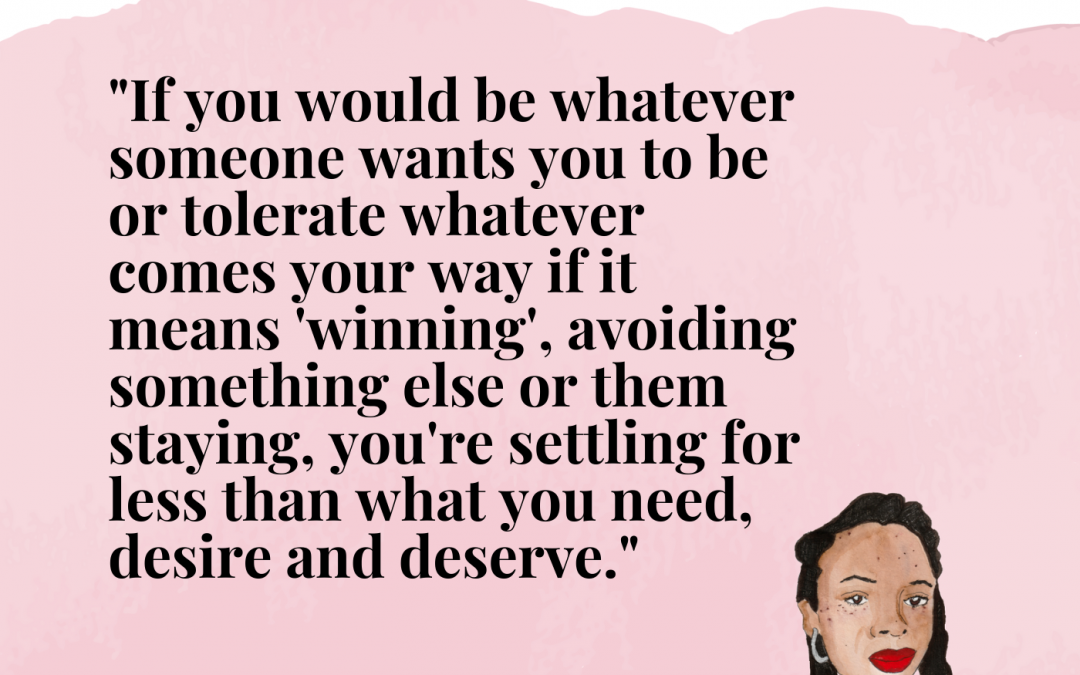1.You’re waiting for them to ‘do the right thing‘.
This blocks you from doing it for you, though, and you continue to accept a situation that doesn’t allow you to meet your emotional needs. The things that frustrate us about others, that we’re waiting on them to do always offer a clue about what we need to be and do for ourselves. You are your responsibility.
2. You stay in the wrong relationship to avoid being alone and confronting who you really are.
This means that you don’t get to know and take care of you or be in a better relationship because you settle for crumbs and hiding out. Choosing a relationship from a place of fear instead of desire always results in compromising your needs, values and boundaries.
3. You’d rather explain, discuss, argue, reiterate and even PowerPoint your way through a relationship than stop talking and do something.
After a while, you (and they) don’t take you seriously. You lose credibility because they know the talking pacifies you, but you also inadvertently communicate that you will settle for how things are if it means that you don’t have to act.
4. You want them to be the one to end the relationship.
If they’re unwilling to, though, because, for example, they want to avoid being The Bad Guy, keep their options open or stay in control, you decide that there’s still a chance until they say there isn’t. Clinging to the crumbs removes your agency because you act like you have zero say over your circumstances or choices.
5. You’re trying to fix/help/heal your partner into changing instead of addressing your pattern.
Using their problems as a distraction blocks your healing and growth, though. It’s critical to examine the baggage behind you trying to get them to change. Pay attention to the origins of your Florence Nightingale and rescuer inclinations.
6. You want your partner to change first before you will consider addressing your issues.
Someone else’s change has nothing to do with your change, though. You expect something that you’re not prepared to reflect in your own actions. Whether you’re settling for crumbs from others or yourself, it’s still crumbs, and it’s still a problem.
7. You’d sometimes rather stay and complain than accept the situation and work with what you have or opt out.
This leads to resentment and frustration-inducing situations where you feel stuck. If you can’t accept someone for who they are, you don’t respect them. And if you can’t have a loving relationship based on who they are, you won’t respect you and your needs. Without respect, there is no love, care, or trust.
8. You’d rather try in a limited or even non-existent relationship than try in a real relationship.
As a result, your efforts are limited. This is your uncomfortable comfort zone. You know it hurts, but at least you know [the crumbs] you’re dealing with. Avoiding the unfamiliar, though, keeps you locked in frustrating dating and relationship patterns instead of an intimate, mutually fulfilling relationship.
9. You prefer to keep ‘thinking things through’ than take action.
Trying to think things out to the nth degree though, keeps you in situations long past their sell-by-date. It also exacerbates anxiety and self-doubt because you’re not allowing you to live fully.
10. You think saying ‘I love you’ is the action or enough to justify continuing the relationship.
Love is more than a feeling or words. Your actions have to be an act of love towards yourself as well as them. Sometimes we think that talking about love will sprinkle magic fairy dust on a relationship. Love, care, trust and respect don’t require you to settle for crumbs; you embody them, you give and receive them because you didn’t settle.
11. You believe that if you love enough, this is a huge contribution, so you focus on directing your feelings at Mr/Miss Unavailable to try to make them become emotionally available.
Believing it’s about loving someone into becoming your ideal situation means that you direct pain, not love, though. Water seeks its own level. Hiding out in an unavailable relationship means that you don’t have to risk vulnerability because the relationship doesn’t allow for it.
12. You have little or no boundaries.
You might not call it that, and instead, possibly see it as ‘unconditional love’ and ‘fighting for your relationship’. However, if avoiding conflict, criticism, rejection, disappointment, and abandonment dictates who you’re with and whether you stay or go, you’re living on crumbs as a result of busting your boundaries. If you would be whatever someone wants you to be or tolerate whatever comes your way if it means ‘winning’, avoiding something else or them staying, you’re settling for less than what you need, desire and deserve.
Whatever you’re prepared to settle for is what you’re going to get. By addressing your own pattern and becoming more of who you really are, you will raise your standards.

 Add to favorites
Add to favorites 
